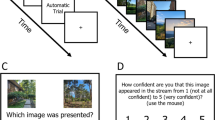Abstract
Much eyewitness research has addressed memory for persons and scenes, but limited work has addressed memory for firearms, frequently an important point in investigations and in court. The present research addressed this topic using the format of a traditional police interview, in which seventy subjects provided unrestricted free recall of a weapon seen in a crime situation, followed by responses to specific questions. Three firearms were used in a between-subjects format: a typical modern semi-automatic pistol, a less-typical Old West revolver, and an atypical single-shot muzzle-loading pistol. In the free recall stage, respondents provided about four times as many correct as incorrect details. However, in the specific-question stage, there were only 1.2 times as many new correct responses as new incorrect details, consistent with current cognitive theory. No difference between the weapons was observed in the production of correct responses, but the revolver and single-shot pistol resulted in more incorrect responses than did the modern semi-automatic, regardless of the saliency of weapon features. These results demonstrate the importance of the original, initial free recall phase in developing accurate identification of a given weapon, and of the type of weapon involved, and have important implications for police interviewing for accurate weapon identification.
Similar content being viewed by others
References
Ahlberg SW, Sharps MJ (2002) Bartlett revisited: reconfiguration of long-term memory in young and older adults. J Genet Psychol 163:211–218
Bartlett FC (1932) Remembering: a study in experimental and social psychology. Cambridge University Press, Cambridge
Bergman ET, Roediger HL (1999) Can Bartlett's repeated reproduction experiments be replicated? Mem Cogn 27:937–947
Grossman D (1996) On killing. Little, Brown, Boston
Herrera MR, Sharps MJ, Swinney HR, Lam J (2014) Deadly force or not? Visual and cognitive interpretation of rifles and BB guns in crime-scene context. J Police Crim Psychol. doi:10.1007/s11896-014-9158-x
Loftus EF (1979) Eyewitness memory. Harvard University Press, Cambridge
Maas A, Kohnken G (1989) Eyewitness identification: simulating the “weapon effect”. Law Hum Behav 11:55–62
McRae K, Sharps MJ, Power J, Newton A (2014) Eyewitness memory for typical and atypical weapons in cognitive context. J Investig Psychol Offender Profiling 11:179–189
Memon A, Bull R (1991) The cognitive interview: its origins, empirical support, evaluation and practical applications. J Community Appl Soc Psychol 1:291–307
Memon A, Zaragoza MS, Clifford B, Kidd L (2010) Inoculation or antidote? The effects of cognitive interview timing on false memory for forcibly fabricated events. Law Hum Behav 34:105–117
Moore, L. (2006, November). Conference on the use of force in law enforcement. Office of the United States Marshal, Fresno, California.
Pickell KL, Ross SJ, Truelove RS (2006) Do weapons automatically capture attention? Appl Cogn Psychol 20:871–893
Sharman SJ, Powell MB (2013) Do cognitive interview instructions contribute to false memories and beliefs? J Investig Psychol Offender Profiling 10:114–124
Sharps MJ (2003) Aging, representation, and thought: Gestalt and feature-intensive processing. Transaction Publishers, Piscataway
Sharps MJ (2010) Processing under pressure: stress, memory, and decision in law enforcement. Looseleaf Law, Flushing
Sharps MJ, Barber TL, Stahl H, Villegas AB (2003) Eyewitness memory for weapons. Forensic Examiner 12:34–37
Sharps MJ, Hess AB, Casner H, Ranes B, Jones J (2007) Eyewitness memory in context: toward a systematic understanding of eyewitness evidence. Forensic Examiner 16:20–27
Sharps MJ, Janigian J, Hess AB, Hayward B (2009) Eyewitness memory in context: toward a taxonomy of eyewitness error. J Police Crim Psychol 24:36–44
Sharps MJ, Nunes MA (2002) Gestalt and feature-intensive processing: toward a unified theory of human information processing. Curr Psychol 21:68–84
Steblay NM (1992) A meta-analytic review of the weapon focus effect. Law Hum Behav 16:413–424
Author information
Authors and Affiliations
Corresponding author
Rights and permissions
About this article
Cite this article
Sharps, M.J., McRae, K., Partovi, M. et al. Eyewitness Memory for Firearms: Narrative Accounts and Specific Questioning in the Elucidation of Accurate Information. J Police Crim Psych 31, 288–294 (2016). https://doi.org/10.1007/s11896-015-9184-3
Published:
Issue Date:
DOI: https://doi.org/10.1007/s11896-015-9184-3




